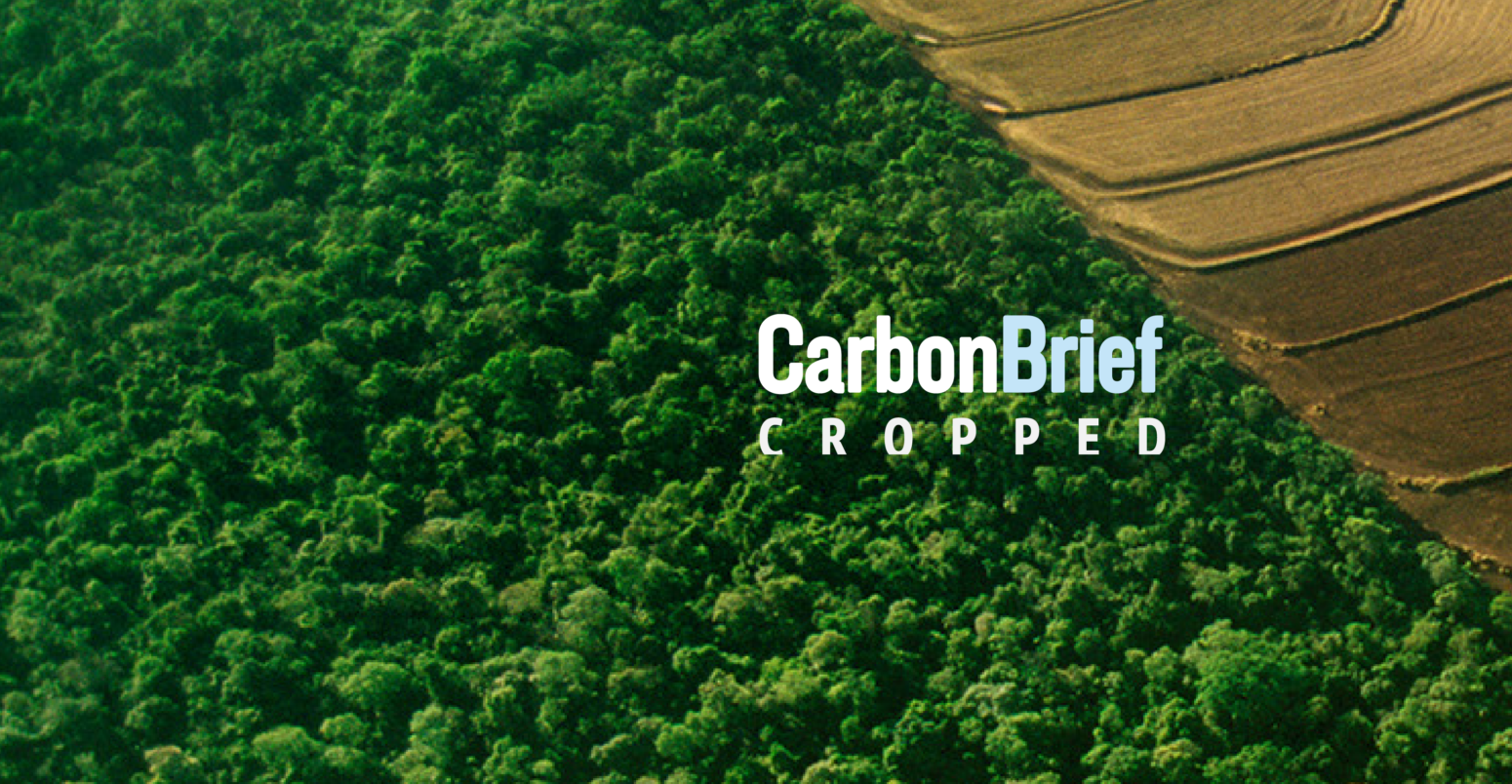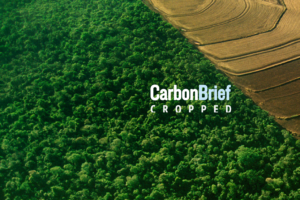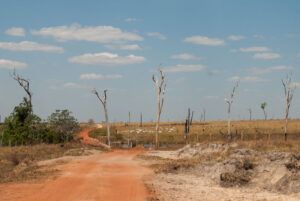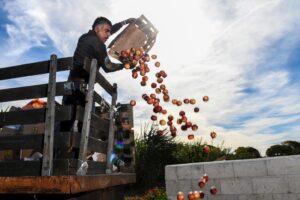
Cropped 5 July 2023: Grain deal fears; Peru deforestation; COP15 catch-up
Multiple Authors
07.05.23Multiple Authors
05.07.2023 | 3:00pmWelcome to Carbon Brief’s Cropped.
We handpick and explain the most important stories at the intersection of climate, land, food and nature over the past fortnight.
This is an online version of Carbon Brief’s fortnightly Cropped email newsletter. Subscribe forfree here.
Snapshot
The黑海谷物交易, which enables safe grain trade from Ukraine, is about toexpire.Russia’slack of enthusiasm to extend the deal has raised concerns aboutfood securityin the Horn of Africa.
Sign upto Carbon Brief's free "Cropped" email newsletter. A fortnightly digest of food, land and nature news and views. Sent to your inbox every other Wednesday.
ThePeruvian Amazonhas lost more than 18,000 hectares of forest due to gold mining in the last two years, latest figures show.
Six monthson from theCOP15biodiversity summit, Carbon Brief spoke to a UKlead negotiatorabout the global agreement and highlighted recent naturefinance updates, includingreportsof the UK government planning todropits£11.6bn climate pledge.
Key developments
Weak grain deal
HIGHLY IMPACTED:Supplies to the Horn of Africa might be badly impacted if the Black Sea grain deal ends,Reutersreported. The newswire detailed that the agreement was brokered by the United Nations and Turkey last year andaimedto secure the commercial trade of food and fertilisers from three Ukrainian ports in the Black Sea. However, Russia has threatened to withdraw from the deal unless the UN removes the “obstacles” to exporting its own grains and fertilisers. Aid officials warned that 60 million people in seven east African countries still face food insecurity, meaning “another hike in food prices would add to the tens of millions of people facing hunger”.
RUSSIA’S DEMAND:Reuterspointed out that Russia is “pessimistic” about renewing the Black Sea grain deal due to lack of progress on other agreements relating to exports. As a response, the European Union seeks to incentivise Russia by reconnecting the Russian Agricultural Bank to the global financial network, the Financial Times reported. “The deal, under which Russia has guaranteed the safety of grain ships heading to and from Ukrainian ports through waters it controls, is set to expire on 18 July,” the newswire added, but the Kremlin does not expect the deal to be renewed.
SIDE EFFECTS:The UN secretary-general Antonio Guterres has labelled the current deal a “beacon of hope”,Deutsche Wellewrote, but its expiry would “pose global consequences”. It added that Ukraine is one of the “world’s largest grain suppliers” and feeds 400 million people. Any potential interruption to that grain trading would affect African and Middle East countries, with cost of grain transportation through sea and land increasing. “Ships that want to cross the Black Sea already have to be insured for thousands of dollars,” the outlet reported. “Shipping companies might be reluctant to send their ships through the war zone if there is no Russian approval.”
Deforestation frontline
THREATS TO THE AMAZON:An investigation led by the Peruvian websiteConvoca和热带雨林网络调查发现that the agrifood activities of the Mennonites religious group has deforested more than 4,800 hectares of rainforests in two regions of the Peruvian Amazon. The outlet pointed out that, 60 years ago, the Mennonites arrived in the Peruvian jungle to evangelise communities, but now they are converting “the Amazon forests into extensive areas of cultivation and pastureland” without obeying the laws. In a separate article,Mongabayreported that the Peruvian Amazon lost more than 18,000 hectares of forest due to legal and illegal gold mining in the past two years. The Monitoring of the Andean Amazon Project analysed satellite data of deforestation in Madre de Dios, located in the southeastern Peruvian Amazon, which borders Brazil and Bolivia, the outlet reported. Regions where Indigenous communities live are the most affected, such as: Barranco Chico, with 816 hectares deforested; San José de Karene, 602; and Tres Islas, 482.
DEFORESTATION SCALES:An analysis by Global Forest Watch found that an area of tropical forests the size of Switzerland was lost globally last year,BBC Newsreported. Every minute, an area of forest equal to 11 football pitches was lost, with Brazil leading the deforestation. It means that international policymakers have not achieved the progress needed to deliver the pledge made in 2021 at COP26 to end deforestation by 2030, the outlet added. However, Indonesia saw a reduction in forest loss, showing “that reversing this trend is achievable”. The analysis “shows that global deforestation in 2022 was over 1m hectares above the level needed to be on track to zero deforestation by 2030,” Rod Taylor from the World Resources Institute told BBC News.
GLIMMER OF HOPE:On 29 June, the EU Commissionannouncedthe entry into force of the EU deforestation law, which, as亚慱官网previously reported, aims to prevent the sale and importation of seven goods in the EU, such as cocoa, coffee and palm oil grown on deforested land. The new law sets a period of 18 months for traders and operators to implement the rules, the EU Commission added. Large chocolate companies, such as Lindt & Spruengli,FerreroandUnilever,have backed the law,Bloombergwrote. However, it adds that big producer countries, such as Ghana, warn that resulting higher prices might be passed on to consumers. In a comment article published byEuronews, Anke Schulmeister, senior forest policy officer at WWF’s European policy office, said that it will “help stop the destruction of our remaining rainforests, and protect Indigenous peoples and local communities depending on them”.
Spotlight
It has been six months since the new global deal for nature was agreed at theCOP15summit in Montreal. Yesterday, theGuardianreported that the UK is planning to “drop” its £11.6bn climate funding pledge, £3bn of which was supposed to be for nature. The government hasdeniedthis. TheGlobal Environment Facilityfinalisedplansto set up a “game-changer” fund to help countries implement the COP15 deal. The UK and France launched a biodiversity credits initiative to boost private investment in nature projects,Business Greenreported.
Carbon Brief’s Orla Dwyer spoke toAndrew Stott, one of the UK’s lead negotiators at COP15, to discuss his thoughts on the agreement now that the dust has settled. Stott recently retired as a science adviser at the UK Department for Environment, Food and Rural Affairs and has been involved in UN biodiversity summits since 2004.
CARBON BRIEF:COP15 ended with theKunming-Montrealframework, but it was not without somecontroversyandobjections. How did you feel when the deal was agreed?
ANDREW STOTT:I felt relief, but also I was very disappointed in the way that process went, with the gavel, the speed at which that was done, because I wasn’t comfortable with that sort of process. I also wasn’t happy that theDemocratic Republic of Congowas in that position because I had hoped we got to the point where everyone had agreed…at the time, we didn’t really feel that celebratory about it because of those issues. With some reflection, and also with the very positive feedback we were getting from lots of different places, you could feel, actually, we have achieved a really good outcome on this.
CB:Is that your current view?
AS:Yeah, I was always of the opinion that it was very ambitious and the UK was pushing a very ambitious line. [There is always] this issue as to whether you’re pushing for something which everyone knows is needed, but is it going to be realistic to actually achieve it? It’s a balance between having the ambition to drive sufficient effort to get there, possibly, or the risk of repeated failure.
CB:The 2020Aichi targetsweren’t met. Did this failure push more ambition for 2030?
AS:They weren’t met, but they did drive action in many areas. It wasn’t sufficient action, but they did drive action and they were a focus for action. So I don’t like to say they were a complete failure. They were ambitious and they drove action…because of that experience, I think we ended up being able to negotiate something much stronger coming out of COP15 than we were at COP10.
News and views
SETBACK:The European People’s Party and its allies blocked the EU’s nature restoration law from passing a key committee vote,Politicoreported. It was “part of a larger effort to press the pause button on environmental legislation”, the outlet added. The centre-right grouping of parties argued that industry and farmers might be at risk from the Green Deal proposals which aim to reduce pesticide use and set land-use changes. The European parliament will vote on the law later this month. In a separate article,Politicopointed out that small farmers in the EU disagree with Copa-Cogeca, the region’s largest farming lobby group, which claims it represents the voices of 22 million farmers.
SPEEDING UP LAND RECOGNITION:Latin America is making “slow progress” in recognising land titles for Indigenous communities,Diálogo Chinowrote. A report published by the Rights and Resources Initiative found that fewer than 1% of 16 Latin American countries’ total land has legal recognition for Indigenous peoples, Afro-descendants and local communities, which makes up 21m hectares. However, “even in recognised areas, communities face tenure insecurity due to invasion of their land”, the outlet noted. The study also says that, across the 16 countries, 79% of the land is state-owned or privately owned, while 17.6% belongs to Afro-descendants and 3.2% to the collective use for such communities.
MOVING OUT:USscientists will be able to move species outside their previous range as a “last resort” to ward off extinction risks, theAssociated Pressreported. The newswire said the US already allows the relocation of species struggling due to climate change on a “limited basis”, but newly changed federal regulations will expand this to include some of the most “imperilled plants and animals protected under the Endangered Species Act”. This practice has been “long considered taboo” due to the risk of disrupting native ecosystems and species, the Associated Press said, adding that it is now “gaining acceptance among many scientists and government officials as climate change alters habitats around the globe”.
PALM OIL PLANS:India’s plan to expand domestic production of palm oil is impacted by a “lack of mills and unsuitable climates”, according toChina Dialogue. The country is the world’s second-biggest consumer of palm oil, most of which is imported from abroad. The outlet said that, two years ago, the Indian government “set out to reverse this trend” by encouraging farmers to grow oil palms, but progress has been slow. China Dialogue’s reporting explained: “14 of the 22 states slated for increased oil palm cultivation do not have mills to process fruits into palm oil and that area-wise palm oil expansion targets were not met in 2021–22 or 2022–23.”
STARTS AND ENDS:Qu Dongyu has been re-elected for a second term as director general of the UN’s Food and Agriculture Organization (FAO). Qu was the only candidate for the position and his term will last from 1 August this year until July 2027, the FAO said in apress release. In aspeechat the ongoing 43rd session of the FAO conference, QU set out his plans for the “reinvigorated” organisation. Meanwhile, in the UK, Zac Goldsmithstepped downfrom his position as international environment minister. Hisresignationletter stated: “The UK has visibly stepped off the world stage and withdrawn our leadership on climate and nature.”
TREES AND CLIMATE:Trees provide an “awe-inspiring” range of benefits, but they also face many threats, a British Ecological Society conference heard last week. Pests, diseases and climate change are among the key problems for forests. Academics and other experts discussed research highlighting the importance of trees for biodiversity, climate change and people. Carbon Brief attended the two-day conference andreportedon the main themes discussed. Separately last week, the气候变化委员会的progress report said UK tree planting has been “too slow” and planting rates will need to double by 2025 to reach government targets.
Extra reading
- The critical role of mangroves in adapting to climate change——格拉德斯通泰勒,非营利的季度
- Call of the rewild: restoring ecological health to the Emerald Isle–Ed O’Loughlin, New York Times
- Can South America bring down chemical use in agriculture?–Pablo Corso, Diálogo Chino
- Start-ups are adding antacids to the ocean to slow global warming. Will it work?–Jeff Tollefson, Nature
New science
Climate change perception, adaptation strategies and constraints amongst urban farmers in Anambra Metropolis, Nigeria
Climate and Development
The socioeconomic conditions of urban farmers in Nigeria could threaten the success of climate adaptation measures. This is one of the main findings of a study in which researchers carried out household surveys to understand the urban farmer’s perception of climate change. The study found that most urban farmers in the surveyed area perceive climate change through its impacts, such as weed infestation or river drying, while having limited knowledge of adaptation measures such as adjusting soil- and water-use strategies. “There is a need to support urban farmers in developing countries by providing credit facilities and integrating agricultural lands into urban land-use policies,” the study added.
Accounting for forest condition in Europe based on an international statistical standard
Nature Communications
A third of EU forested areas have a “declining condition”, characterised by a decrease in soil organic carbon, tree cover density and species richness of threatened birds, a new study estimates. The researchers spatially assessed the condition of forest ecosystems in Europe by using a United Nation’s standard to rate them from 0 to 1, where 0 means a “degraded ecosystem”, and 1 represents a condition of primary or protected forests. They found that, across 44 forest types, there was an increase from 0.566 in 2000 to 0.585 in 2018. The study concluded that “forest ecosystems will need further restoration, improvements in management and an extended period of recovery to approach natural conditions”.
Earlier collapse of Anthropocene ecosystems driven by multiple faster and noisier drivers
Nature Sustainability
New research found that sudden ecosystem changes could occur “sooner than we think” under rising and compounding levels of stress. The study used four models that simulated abrupt changes in ecosystems impacted by a range of human interactions. The findings indicated that “real-world tipping elements are more likely to be driven by multiple, fast drivers and extreme events” rather than single, slow drivers. The scientists wrote that while the quantitative findings “could be viewed as representing worst-case scenarios”, they have “potentially profound implications for our perception of future risks associated with the climate and ecological crises”.
In the diary
- 2-6 July:Association for Tropical Biology and Conservation, Tamil Nadu, India.
- 24-26 July:2023 UN Food Systems Stocktaking Moment, Rome, Italy.
- 23-27 July:31st International Congress for Conservation Biology (ICCB), Kigali, Rwanda.
Cropped is researched and written byDr Giuliana Viglione,Aruna Chandrasekhar,Daisy Dunne,欧尔德怀尔andYanine Quiroz. Please send tips and feedback to[email protected]





